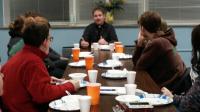Coraggio Members

Evansville’s Coraggio group met Jan. 9 at Holy Trinity Parish in Evansville. The evening began with Eucharistic adoration led by Father Jason Gries, pastor of St. John the Evangelist Parish in Daylight and Holy Trinity Parish. After praying vespers and the rosary, the group gathered to hear a presentation from Father Gries about Canon Law.
Father Gries began studying for his Canon Law license during the summer of 2014 at the Catholic University of America in Washington, D.C. His program of study will take place over five summers, which will allow him to continue his priestly ministry in the diocese. He explained that Bishop Charles C. Thompson would like to have three or four other pastors receive Canon Law licenses in the next few years to assist in the process and allow all of the priests to remain pastors of parishes at the same time.
Father Gries mentioned that for the first centuries of the Church’s existence, Canon Law was more informal. Beginning in the 11th century, Canon Law started to codify with the writing of a jurist named Gratian. The code received it most recent updates in 1983.
Father Gries’ main focus in studying Canon Law is annulments. He explained that he took an annulments class as an elective during his study at St. Meinrad Seminary with then-Father Charles Thompson of the Archdiocese of Louisville as the instructor. Father Gries noted that technically, the term annulment is not correct. The official term is declaration of nullity, which states that a sacramental marriage never occurred.
Father Gries said that many people have misconceptions about the annulment process. One common misconception is that a declaration of nullity is simply a Catholic divorce. Divorce in the legal realm dissolves a marriage. A declaration of nullity in the Church says no sacramental marriage existed.
Another frequent misconception is that divorced Catholics cannot receive the Sacraments. Father Jason pointed out that divorced Catholics can receive the sacraments; the issue occurs when a Catholic who remarries receives the Sacraments before the first marriage receives a declaration of nullity. Without one, a Catholic who remarries is technically committing adultery. For a remarried Catholic whose previous marriage isn’t annulled yet, the Church asks that the married couple live as “brother and sister” until the first marriage receives a declaration of nullity.
Many people believe that children born in previous marriages become illegitimate. Father Jason explained that the state declares whether children are illegitimate. In the eyes of the Church, if the parents are legally married when the children are born, the children are legitimate – even if the marriage receives a declaration of nullity later.
Father Gries mentioned that several types of annulments exist; and during the annulment process, the Church looks to see what sort of issues might render the marriage null.
For Catholics, marriage ultimately is a sign of God’s love for us. Father Gries pointed out that throughout the Bible, the image most frequently used to describe the relationship between God and humanity is a marriage. “Christ Himself showed how important marriage was,” he explained, noting that in the Gospel of Matthew, Christ says that man must not divide what God has joined; and in the Gospel of John, Jesus performs the miracle at the Wedding of Cana where water turns to wine.
Father Gries noted that many divorced Catholics feel left out of the Church and might be intimidated by the annulment process. “They carry this cross by themselves,” he noted, comparing it to a child who skins his knee, but won’t let his parents see the injury. Without looking at the injury, it is impossible to help someone who is hurt. “We want to help you find healing,” Father Gries added, saying that the annulment process ultimately looks to heal people.
Father Gries also explained that although Canon Law can be daunting and seem legalistic at times, the final paragraph of Canon Law is the ultimate benchmark the Church uses: “the salvation of souls, which must always be the supreme law in the Church, is to be kept before one’s eyes.”
Coraggio meets the second Friday of each month at Holy Trinity parish. It is open to all Catholics in the Evansville area ages 18-35. The next meeting is Feb. 13. For more information, email coraggioevansville@gmail.com or visit the group’s Facebook page at facebook.com/coraggioevansville

